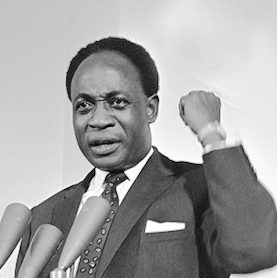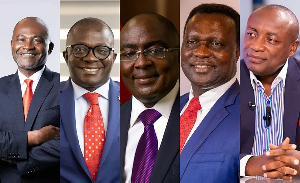The long-cherished dream of African continental unity has been a beacon of hope for the people of Africa. Leading this movement was Kwame Nkrumah, Ghana's first President and a visionary leader whose enduring ideas continue to inspire generations.
Kwame Nkrumah had earlier declared on the day Ghana gained independence in March 1957 that "The independence of Ghana is meaningless unless it is linked up with the total liberation of Africa". In other words, Ghana could not become a tiny oasis of freedom amidst a vast expanse of Africa that was still colonised, oppressed, suppressed, and exploited.
The whole of Africa must be free! Nkrumah's vision transcended politics; it was a heartfelt commitment to liberate and prosper the entire continent. In this article, I will explore Nkrumah's powerful thoughts on African unity, their historical context, the ongoing pursuit of his vision, and how his ideas support the key principles of the African Union (AU) Agenda 2063.
The historical context:
To grasp Nkrumah's ideas and the significance of his vision for African unity, it's essential to understand the historical context of his leadership. The mid-20th century was a tumultuous period as African nations emerged from colonial rule, and Nkrumah played a pivotal role in Ghana's successful struggle for independence in 1957.
Some of his contemporaries also fought hard to liberate their respective countries from colonial rule in less than a decade, notable mentions include Nnamdi Azikiwe of Nigeria, Sekou Toure of Guinea, Leopold Sedar Senghor of Senegal, Amilcar Cabral of Guinea-Bissau & Cape Verde, Kenneth Kaunda of Zambia, Julius Nyerere of Tanzania, Samora Marcel of Mozambique, Mobido Keita of Mali, among others, with the support of Stalwarts like Emperor Haile Selassie of Ethiopia and Abdul Gamal Nasser of Egypt.
During this era, Nkrumah recognized the formidable challenges newly independent African nations faced. The legacy of colonialism included economic exploitation, political division, and social inequality. The vision of a united Africa promised to overcome these hurdles and secure a brighter future for the continent's people.
Nkrumah's vision for African unity:
Kwame Nkrumah's vision for African unity was eloquently expressed in his renowned work, "Africa Must Unite," and his impassioned call for "The United States of Africa." Central to his vision was the belief that the colonial borders, arbitrarily drawn by former colonial powers, were detrimental to Africa's progress. He argued that a united Africa could harness its collective resources, knowledge, and human capital to combat poverty, underdevelopment, and external interference.
Political unity: Nkrumah envisioned a united Africa with a single constitution, parliament, and president—a United States of Africa. He believed that political unity would empower Africa to confront internal and external challenges effectively.
Economic self-reliance: Emphasizing economic self-sufficiency, Nkrumah advocated for African nations to industrialize, cooperate economically, and reduce reliance on former colonial powers and external influences.
Cultural identity: Acknowledging the significance of African culture and identity, Nkrumah championed the Pan-African movement. He believed that a united Africa should celebrate its diverse cultures while nurturing a shared African identity.
African solidarity: Nkrumah ardently promoted African solidarity in international affairs, arguing that a united Africa would wield a more influential global voice and better safeguard its interests.
Challenges and setbacks:
Nkrumah's vision encountered numerous challenges and setbacks. The political realities of the time, including Cold War dynamics and Western interests, often obstructed progress toward African unity. Additionally, some African leaders were reluctant to relinquish power to a continental government, fearing the loss of national sovereignty.
Nkrumah's presidency in Ghana faced various internal and external obstacles, culminating in his overthrow in 1966. Nevertheless, his ideas continued to resonate across Africa, remaining a symbol of hope for continental unity.
The unfinished business and AU Agenda 2063:
Today, the dream of African continental unity remains largely unrealized. While significant developments such as the metamorphosis of the Organization of African Unity (OAU) into the African Union (AU) and regional economic communities have emerged, challenges persist. Political conflicts, economic disparities, and the lingering influences of neocolonialism impede progress toward the United States of Africa.
However, Nkrumah's legacy continues to strongly inspire efforts to achieve African unity. The AU's Agenda 2063 outlines a vision for a united, prosperous, and peaceful Africa. African leaders continue to explore ways to strengthen continental cooperation, address security concerns, and promote economic integration.
Key pillars of AU Agenda 2063:
Nkrumah's overarching vision was for Africa to have a common government, common currency, one army, one central bank, one passport, one foreign policy, a common language, and advanced scientific innovation, among others. However, the AU Agenda 2063 draws on some of these aspirations to constitute the new development blueprint for the continent.
African identity and renaissance: Celebrating and preserving Africa's diverse cultures while fostering a sense of pride and belonging as Africans.
Good governance and democracy: Promoting democratic institutions, rule of law, transparency, and accountability in governance.
Peace and security: Preventing conflicts, enhancing stability, and combating terrorism, illicit arms trafficking, and organized crime.
Integrated infrastructure development: Investing in transportation, energy, water, and digital infrastructure to connect African nations and regions. Cross-border infrastructure development is crucial to advancing intra-regional trade and investments for development.
Industrialization and economic development: Promoting sustainable industrialization, value addition, and job creation to reduce reliance on primary commodities.
Human capital development: Enhancing education, skills, and healthcare to cultivate a well-educated and healthy workforce.
Science, technology, and innovation: Harnessing science, technology, and innovation to drive economic diversification and competitiveness.
Environmental sustainability and natural resource management: Advocating responsible natural resource management and climate resilience.
Gender equality and women's empowerment: Championing women's and girls' rights and empowerment.
Partnerships and African solidarity: Building partnerships for the implementation of Agenda 2063, fostering solidarity among African states, and engaging with the global community.
In conclusion, the "Unfinished Business" of African unity, as embodied in AU Agenda 2063, underscores the multifaceted nature of Africa's development challenges and opportunities. Kwame Nkrumah's vision and the foundation laid through the then OAU and the current AU's agenda all deeply emphasize the need for collective action, self-reliance, and a profound commitment to the well-being of the African people.
The ongoing journey to realize these visions testifies to Africa's determination to shape its destiny and surmount past obstacles to achieve shared prosperity for the greatest majority of its people. It behooves the new generation of emerging Pan-African leaders and the youth, in general, to carry on the torch that was lit by forebears like Kwame Nkrumah to win for Africa the battle of economic independence. Indeed, Africa Must Be Free!
Opinions of Friday, 22 September 2023
Columnist: Selorm Kofi Dake















